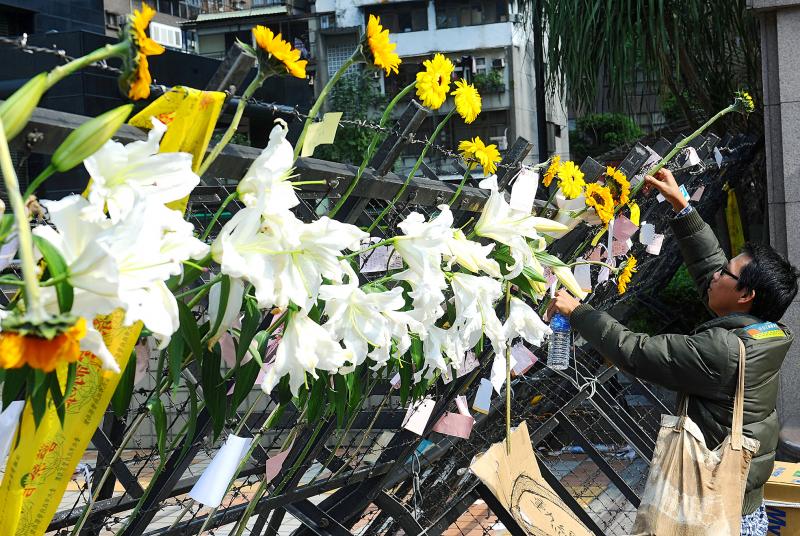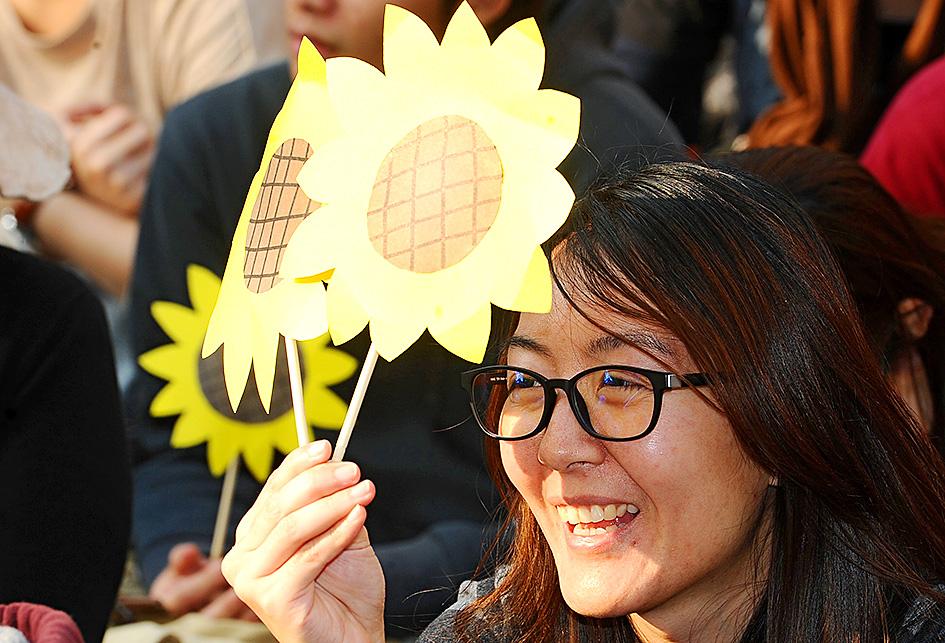Recent weeks have seen several retrospectives on the anniversary of the Sunflower movement and their occupation of the legislature, along with the protests that supported their actions. These retrospectives have focused almost entirely on their transformative political legacy. Yet one of the most important effects of the Sunflowers was saving Taiwan from the shattering economic consequences of then-president Ma Ying-jeou’s (馬英九) pro-China economic policies.
The Cross-Strait Service Trade Agreement (CSSTA) that put a half million or more people into the streets was a follow-on agreement to the notorious Economic Cooperation Framework Agreement (ECFA), inked in 2010. It was to be followed in turn by a goods agreement, which thankfully was never negotiated. The Sunflowers saved us from that.
ECFA began life as the Comprehensive Economic Cooperation Agreement (CECA), intended by the Ma administration as an obvious reference to the free trade agreement China had signed with Hong Kong (CEPA, Closer Economic Partnership Arrangement). This parallel subordination of Taiwan to Beijing and Ma’s belittling of Taiwan, was met with strong local opposition and the name was changed.

Photo: Chang Chia-ming, Taipei Times
Indeed, Chinese dictator Hu Jintao (胡錦濤) explicitly stated in his “six point” speech on New Year’s Eve of 2008 that a Taiwan-China economic agreement must be signed under Beijing’s “one China principle,” implicitly ratifying China’s claim to Taiwan.
That the economic agreements were intended as levers to the annexation of Taiwan was also stated by Chinese officials and mouthpieces such as “scholars” working for “Taiwan research institutes” in China. Foreign news media initially recognized this, even though later many would cheerlead for ECFA.
The Ma administration confirmed this with its statement that ECFA would not be negotiated under the WTO, though both nations were members.

Photo: Chang Chia-ming, Taipei Times
The services pact (signed in June of 2013) called for the opening of 64 business sectors in Taiwan to China, and 80 sectors in China. These included service industries such as distribution, travel and recreation, construction, health, sports, transportation and finance.
People think of Taiwan as a place that makes things, but most of the economy is driven by services. This meant that CSSTA would touch ordinary Taiwanese lives in a way that ECFA did not.
As the brilliant blog Letters from Taiwan observed at the time, this pact would have devastating consequences for Taiwan’s service businesses. The writer, Ben Goren, who was working in the dental industry at the time, wrote that CSSTA “is now generating a sense of fatalism among Taiwanese [dental device] distributors. If Chinese companies start to invest in or buy Taiwanese device distributors, international suppliers will shift their communication to the Chinese companies and Taiwanese distributors will become only ‘local sub-dealers.’”
This subordination of local firms to Chinese companies meant that Taiwan’s international economic links — in this case, contracts for medical devices — would be managed from China. Goren concluded: “If China can convince these suppliers that they can manage distribution in Taiwan as a ‘local area’ in their business chain, Taiwanese businesses will lose their economic sovereignty and be forced to accept terms of business from Chinese companies if they want the rights to distribute products in their own country.”
Multiply that by all of Taiwan’s service businesses. There were also deep fears that ordinary Chinese hairdressers and butchers and bus drivers and manicurists would find their way across the Strait to set up in Taiwan, gutting local businesses.
The student leaders of the Sunflower movement were well aware of this. On Reddit they posted: “…China’s stated aim is to use its economic ties to impact our political system. This trade pact will increase this unequal dependency further in the future, maybe not in 1 or 2 years, but definitely in 10-20. And we fear that this will be a course we cannot reverse in the future.”
Reverse it they did, to their eternal glory.
ECONOMIC PILOT ZONES
Recall too that the trio of agreements heralded by ECFA was only one part of a larger strategy to hollow out Taiwan’s economy. Another prong was Ma’s abortive proposal for “Free Economic Pilot Zones,” a revisit to the 1950s policy of industrial processing zones, using imported labor and taxpayer subsidized water and electricity. These were first mooted around 2010, with legislation finally appearing in 2014.
As described in the legislation, the zones were essentially autocracies where Taiwan’s environmental, labor, financial, land and even government procurement laws applied only weakly, or not at all. They were thus blatantly likely to become a hellscape crawling with throwback dirty industries, where smuggling of goods from China and financial shenanigans would become the norm. The Ma government even initially proposed that future ECFA agreements could be negotiated by the zones themselves, entirely bypassing the central government.
Taiwan’s central bank was highly critical of the zones, saying that Taiwan could not possibility host a dual financial system where one part was heavily regulated while the free trade zones had little financial regulation. That would only lead to massive money laundering.
CHINESE TOURISTS
Yet another prong of this strategy was the flood of Chinese tourists. They too were related to hollowing out the economy. Each and every tourist was a net loss to Taiwan, once environmental and other costs were truly accounted for. Moreover, by purchasing New Taiwan dollars, they helped to increase its value, driving down Taiwan’s technology exports. They also diverted precious investment capital to tourist projects that did little to drive technological innovation and raise local living standards.
Thus, the real reason that the Chinese tourists were cut off when Tsai Ing-wen (蔡英文) was elected president was not to punish her or Taiwan, but because her election signaled that this strategy had failed (along with its companion strategies) and the resources China was expending (recall that tourists going overseas are imports for their home country) would be wasted. Hence, the floodgates were slammed shut.
The abject failure of Taiwan and the US to negotiate a free trade agreement has obscured the fact that CSSTA, by muddying the possibility of economic integration with the US (and other countries), would have made FTA negotiations with other countries more difficult, as longtime Taiwan observer John Tkacik made clear in a talk in March of 2014 on the pact.
Imagine how potential FTAs would have been impacted if the autonomous free trade zones had become reality, and the full scope of the Ma administration’s plan to subordinate Taiwan’s economy to China should become clear. As Tkacik (and others) pointed out, the “opening” by China was restricted to Fujian Province. This led him to believe that “the Chinese were simply treating Taiwan as an extension of Fujian Province.”
Who would have thought that the Sunflowers could destroy all that beautiful wickedness? Yet like Dorothy with her bucket, they snuffed it right out. They drew half a million people to protest in Taipei. They shifted the discourse so that pro-Taiwan voices become dominant, marginalizing pro-China voices at the national level.
The Sunflowers thus saved Taiwan’s economy, the basis of its independent existence, sparking the 2016 election of Tsai and the restoration of Taiwan-centered economic policy.
What a world, what a world!
Notes from Central Taiwan is a column written by long-term resident Michael Turton, who provides incisive commentary informed by three decades of living in and writing about his adoptive country. The views expressed here are his own.

April 14 to April 20 In March 1947, Sising Katadrepan urged the government to drop the “high mountain people” (高山族) designation for Indigenous Taiwanese and refer to them as “Taiwan people” (台灣族). He considered the term derogatory, arguing that it made them sound like animals. The Taiwan Provincial Government agreed to stop using the term, stating that Indigenous Taiwanese suffered all sorts of discrimination and oppression under the Japanese and were forced to live in the mountains as outsiders to society. Now, under the new regime, they would be seen as equals, thus they should be henceforth

Last week, the the National Immigration Agency (NIA) told the legislature that more than 10,000 naturalized Taiwanese citizens from the People’s Republic of China (PRC) risked having their citizenship revoked if they failed to provide proof that they had renounced their Chinese household registration within the next three months. Renunciation is required under the Act Governing Relations Between the People of the Taiwan Area and the Mainland Area (臺灣地區與大陸地區人民關係條例), as amended in 2004, though it was only a legal requirement after 2000. Prior to that, it had been only an administrative requirement since the Nationality Act (國籍法) was established in

Three big changes have transformed the landscape of Taiwan’s local patronage factions: Increasing Democratic Progressive Party (DPP) involvement, rising new factions and the Chinese Nationalist Party’s (KMT) significantly weakened control. GREEN FACTIONS It is said that “south of the Zhuoshui River (濁水溪), there is no blue-green divide,” meaning that from Yunlin County south there is no difference between KMT and DPP politicians. This is not always true, but there is more than a grain of truth to it. Traditionally, DPP factions are viewed as national entities, with their primary function to secure plum positions in the party and government. This is not unusual

US President Donald Trump’s bid to take back control of the Panama Canal has put his counterpart Jose Raul Mulino in a difficult position and revived fears in the Central American country that US military bases will return. After Trump vowed to reclaim the interoceanic waterway from Chinese influence, US Defense Secretary Pete Hegseth signed an agreement with the Mulino administration last week for the US to deploy troops in areas adjacent to the canal. For more than two decades, after handing over control of the strategically vital waterway to Panama in 1999 and dismantling the bases that protected it, Washington has